
The Open Flemish Liberals and Democrats is a Flemish liberal political party in Belgium. The party has been described as centre-right and has smaller factions within the party that have conservative liberal and social liberal views. The party is a member of the Liberal Group, Renew Europe, and Liberal International.
Vooruit is a Flemish social democratic political party in Belgium. It was known as the (Flemish) Socialist Party until 21 March 2021, when its current name was adopted.

The New Flemish Alliance is a Flemish nationalist, conservative and Eurosceptic political party in Belgium. The party was established in 2001 by the right-leaning faction of the centrist-nationalist People's Union (VU).

The Federal Government of Belgium exercises executive power in the Kingdom of Belgium. It consists of ministers and secretary of state drawn from the political parties which form the governing coalition. The federal government is led by the prime minister of Belgium, and ministers lead ministries of the government. Ministers together form the Council of Ministers, which is the supreme executive organ of the government.

Alexander De Croo is a Belgian politician and businessman who is the prime minister of Belgium. He assumed office in October 2020 and is currently acting in a demissionary capacity.
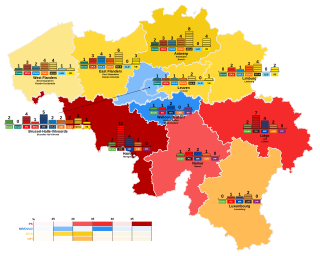
Federal elections were held in Belgium on 13 June 2010, during the midst of the 2007-11 Belgian political crisis. After the fall of the previous Leterme II Government over the withdrawal of Open Flemish Liberals and Democrats from the government the King dissolved the legislature and called new elections. The New Flemish Alliance, led by Bart De Wever, emerged as the plurality party with 27 seats, just one more than the francophone Socialist Party, led by Elio Di Rupo, which was the largest party in the Wallonia region and Brussels. It took a world record 541 days until a government was formed, resulting in a government led by Di Rupo.

Theo Francken is a Belgian politician who has been a member of the Chamber of Representatives since 2010. He is a member of the New Flemish Alliance (N-VA), a conservative Flemish nationalist party.
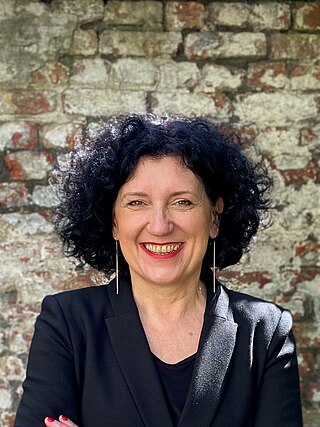
Annemie Turtelboom is a former Belgian minister, who served in the Federal Government of Belgium as a member of the Open VLD party, initially as minister for Asylum and Migration, and later Home Affairs and Justice. She has also served as minister of Finance, Budget and Energy in the Flemish Government. After leaving politics, she became the Belgian member of the European Court of Auditors, a position she has held since 2018.

The Di Rupo Government was the federal cabinet of Belgium sworn in on 6 December 2011, after a record-breaking 541 days of negotiations following the June 2010 elections. The government included social democrats (sp.a/PS), Christian democrats (CD&V/cdH) and liberals, respectively of the Dutch and French language groups. The government notably excluded the New Flemish Alliance (N-VA), the Flemish nationalist party which achieved a plurality and became the largest party. Its absence, together with the unwillingness of Open Vld to enter into an eight-party coalition that included the green parties, caused the government coalition to lack a majority in the Dutch language group. It was the first time that the Belgian prime minister had been openly gay, as Di Rupo became the world's first male openly gay head of government. Elio Di Rupo also became the first native French-speaking prime minister since 1979 and the first prime minister from Wallonia since 1974 and first socialist prime minister since 1974.
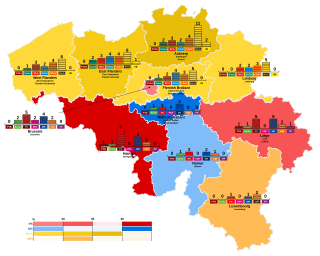
Federal elections were held in Belgium on 25 May 2014. All 150 members of the Chamber of Representatives were elected, whereas the Senate was no longer directly elected following the 2011–2012 state reform. These were the first elections held under King Philippe's reign.
Following the simultaneous federal elections and regional elections of 25 May 2014, negotiations started to form a new Federal Government as well as new regional governments: a Flemish, Walloon, French Community and Brussels Government. A Government of the German-speaking Community was formed only a few days after the elections.
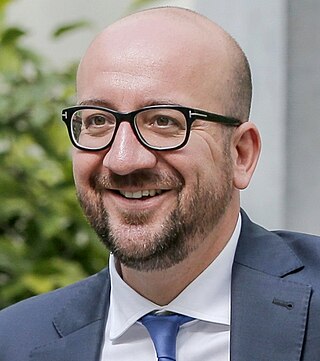
The Michel I Government was the Federal Government of Belgium formed following the 2014 Belgian government formation and sworn in on 11 October 2014. The administration was a centre-right coalition of the New Flemish Alliance (N-VA), the Christian Democratic and Flemish (CD&V), the Open Flemish Liberals and Democrats and the Reformist Movement (MR). The prime minister was Charles Michel. The government had an agenda of socio-economic reforms, especially through austerity measures, with its priorities being improving Belgium's economic competitiveness and reducing unemployment. It fell in December 2018 over the Global Compact for Migration.

The Council of Ministers is the supreme executive organ of the Federal Government of the Kingdom of Belgium. It is a cabinet composed of the Prime Minister, who leads it, and up to fourteen senior ministers. Federal secretaries of state are members of the government, but not part of the Council. The King of the Belgians historically presided over the Council, but this has not happened since 1957. The Council of Ministers formally became a permanent policy structure with the constitutional revision of 1970.
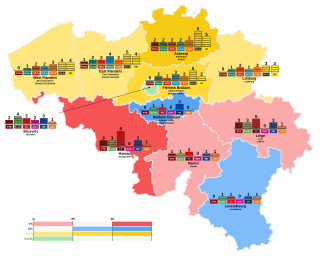
Federal elections were held in Belgium on 26 May 2019, alongside the country's European and regional elections. All 150 members of the Chamber of Representatives were elected from eleven multi-member constituencies.
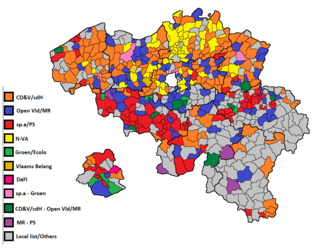
The Belgian provincial, municipal and district elections of 2018 took place on Sunday 14 October 2018. They are organised by the respective regions:
In Belgium, the government formation of 2019–2020 started one day after the federal elections, regional elections and European elections which were all held simultaneously on 26 May 2019. These formations were only the second under King Philippe.
The COVID-19 pandemic in Belgium has resulted in 4,889,888 confirmed cases of COVID-19 and 34,339 deaths.
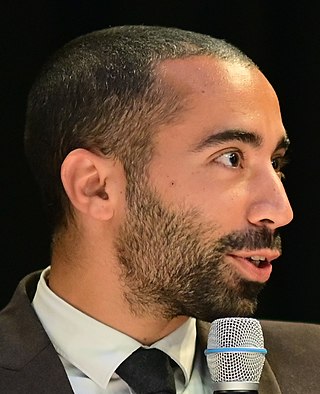
Sammy Mahdi is a Belgian Christian-Democrat politician, a member and the president of CD&V, who in March 2020 became a member of the Belgian Chamber of Representatives.

The De Croo Government is the incumbent Federal Government of Belgium, led by Prime Minister Alexander De Croo since 1 October 2020. It has acted in a caretaker capacity since the resignation of Prime Minister Alexander De Croo on 10 June 2024 following the 2024 Belgian federal election.














